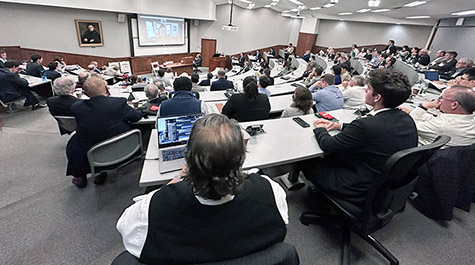William & Mary Law School Hosts 19th Annual Brigham-Kanner Property Rights Conference
As it nears its 20th year, the Brigham-Kanner Property Rights Conference has been renowned for bringing the practicing bar and legal academy together to examine and define the most pressing issues in property rights and eminent domain.
This year’s 19th annual conference, held on September 29-30 at William & Mary Law School, was no exception—and more spirited than ever.
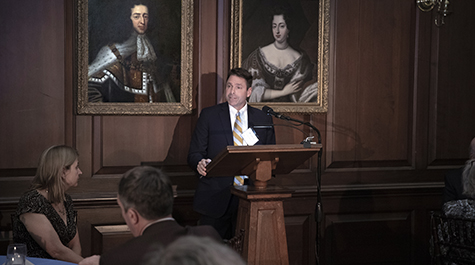 “It’s the participation of both scholars and lawyers that makes this conference so unique and invigorating,” said Andrew Prince Brigham, managing partner and owner of the Brigham Property Rights Law Firm, PLLC, in Jacksonville, Florida, and a member of the Brigham-Kanner Conference Coordination Committee. “In truth, nowhere else is there such an annual gathering to bring together scholars and practitioners to engage in such a function.”
“It’s the participation of both scholars and lawyers that makes this conference so unique and invigorating,” said Andrew Prince Brigham, managing partner and owner of the Brigham Property Rights Law Firm, PLLC, in Jacksonville, Florida, and a member of the Brigham-Kanner Conference Coordination Committee. “In truth, nowhere else is there such an annual gathering to bring together scholars and practitioners to engage in such a function.”
The fact “that this annual gathering began in 2004 and is going stronger than ever is testament both to the importance of property rights and to the men we honor: Toby Prince Brigham and Gideon Kanner,” said A. Benjamin Spencer, dean of William & Mary Law School. “It is also testament to the vision and dedication of many experts who attend every year to share their invaluable insights with other experts and with our grateful students.” 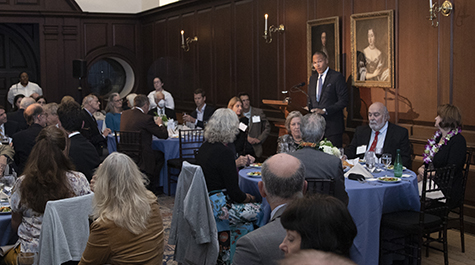
Renowned for its outstanding panel discussions, the Brigham-Kanner Property Rights Conference, Prize and Journal, are named in recognition of the late Toby Prince Brigham, founding partner of Brigham Moore LLP, and Gideon Kanner, Professor of Law Emeritus at Loyola Law School in Los Angeles, for their lifetime contributions to private property rights and their efforts to advance constitutional protection of property. The conference was inspired by William & Mary Law School alumnus Joseph T. Waldo ’78, who suggested it during the Campaign for William & Mary (2000-07).
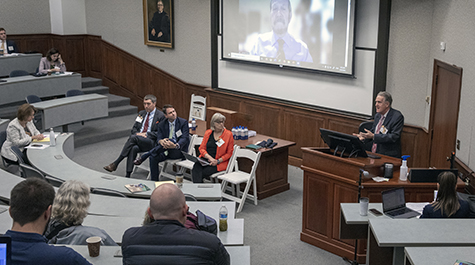 This year’s panel sessions and roundtable discussion covered a wide range of topics. “The Importance of Property Rights” probed the boundaries of property rights and the extent to which courts and commentators disagree about property’s reach, while “Reshaping the Framework: Protecting Property Under the Roberts Court” explored the impact of the Roberts Court on the constitutional framework protecting property.
This year’s panel sessions and roundtable discussion covered a wide range of topics. “The Importance of Property Rights” probed the boundaries of property rights and the extent to which courts and commentators disagree about property’s reach, while “Reshaping the Framework: Protecting Property Under the Roberts Court” explored the impact of the Roberts Court on the constitutional framework protecting property.
A roundtable looking at “Emerging Issues in Takings and Property Rights Litigation” opened the afternoon sessions, followed by “Choosing a Property Regime,” which considered the efficacy of different property regimes for various situations, exploring the factors that affect the choice of a regime for particular resource and social settings and the role of core political and social values in making the choice. And “Property Rights in Times of Scarcity and Crisis” explored a number of questions in the context of recent efforts to address severe droughts, wildfires and other environmental disasters.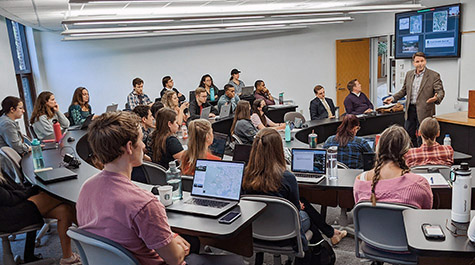
Before the conference officially began, a session on “Land Use Elements of a Property Rights Practice” allowed law students to meet with some of the top eminent domain attorneys from across the U.S. for a discussion on the influence of land use on a property rights practice.
Another session, “Comparative Property Rights: Is There Another Way?” saw Shane Rayman, one of Canada’s foremost property lawyers, join students to discuss the intriguing question, “Is ‘constitutionalizing’ property rights the only approach to a robust legal system of property protections?”
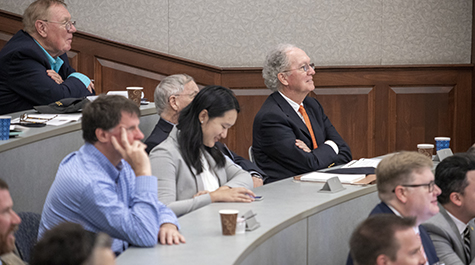 A “Careers in Dirt Law” lunch panel cosponsored by William & Mary Law’s Office of Career Services featured property rights practitioners sharing how they got started, good advice received, and tips for breaking into the field of property law. And a panel on “Practical Advice for Successful Job Interviews and First-Year Practitioners” brought experienced practitioners to provide helpful tips and insights on interviewing, networking and starting legal careers.
A “Careers in Dirt Law” lunch panel cosponsored by William & Mary Law’s Office of Career Services featured property rights practitioners sharing how they got started, good advice received, and tips for breaking into the field of property law. And a panel on “Practical Advice for Successful Job Interviews and First-Year Practitioners” brought experienced practitioners to provide helpful tips and insights on interviewing, networking and starting legal careers.
“The William and Mary law students who take advantage of this great event and spend the day—or more—with us get to see how the things they are learning in class are applied in the world,” said Robert Thomas, Joseph T. Waldo Visiting Chair in Property Rights Law, William & Mary Law School, and Senior Attorney, Pacific Legal Foundation.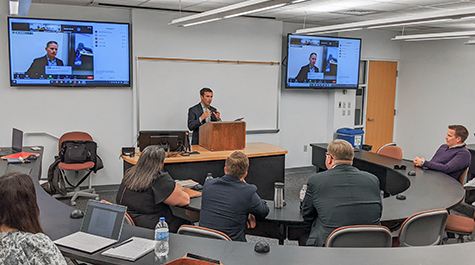
Thomas also enjoyed seeing alumni from the Law School’s “Land Use” and “Eminent Domain and Property Rights” courses return to campus for the event.
“It was heartening to see that many lawyers who first attended this conference as students continue to come as lawyers,” Thomas said. “And I am thrilled to see several emerging property law scholars in attendance, because among them may be the next generation of Brigham-Kanner Prize winners.”
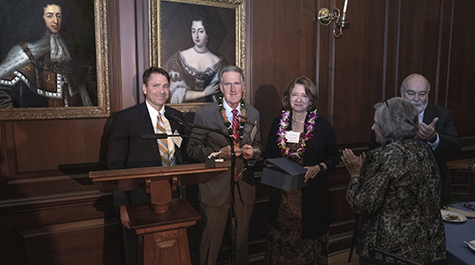 A highlight of the conference each year is the opening banquet, during which the Brigham-Kanner Property Rights Project awards the Brigham-Kanner Property Rights Prize to an individual whose work has advanced the cause of property rights and has contributed to the overall awareness of the important role property rights occupy in the broader scheme of individual liberty. This year’s award recipient was James Burling, Vice President of Legal Affairs at the Pacific Legal Foundation in Sacramento, California.
A highlight of the conference each year is the opening banquet, during which the Brigham-Kanner Property Rights Project awards the Brigham-Kanner Property Rights Prize to an individual whose work has advanced the cause of property rights and has contributed to the overall awareness of the important role property rights occupy in the broader scheme of individual liberty. This year’s award recipient was James Burling, Vice President of Legal Affairs at the Pacific Legal Foundation in Sacramento, California.
“Jim is, by all accounts, a relentless advocate for property rights,” said Lynda Butler, the Chancellor Professor of Law, Emerita, at William & Mary Law School and Director of the Property Rights Project. “Only the second attorney to receive this award, he has worked tirelessly to protect property rights from government overreach and abuse; he simply does not give up.” Butler said that Michael Berger, the first attorney to receive the Brigham-Kanner Prize, once described Burling as “a tireless champion of the rights of those oppressed citizens who happen to own the wrong property at the wrong time.”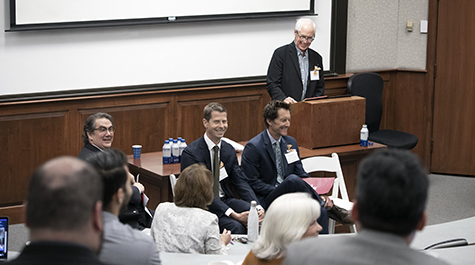
Accepting the award, Burling thanked his colleagues and prior winners, including attendees David L. Callies, the Benjamin A. Kudo Professor of Law, Emeritus, at the University of Hawaii's Manoa School of Law, and James W. Ely, Jr., the Milton R. Underwood Professor of Law, Emeritus, and Professor of History, Emeritus, at Vanderbilt University.
“I also want to thank Toby Brigham, who showed me that there is no limit to the amount of humanity that can be in one person,” Burling said. “And I want to thank Gideon Kanner, who taught me that you can argue for your side and be passionate about that and never stop arguing.”
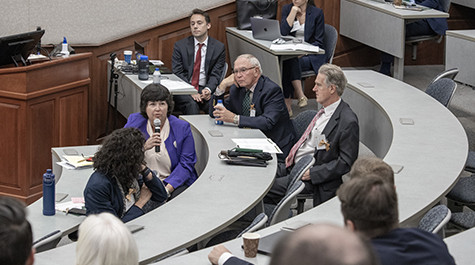 Burling joins an esteemed list of Brigham-Kanner Property Rights Prize winners. Previous recipients include Frank I. Michelman (2004), Richard Epstein (2005), James W. Ely, Jr. (2006), Margaret Jane Radin (2007), Robert C. Ellickson (2008), Richard E. Pipes (2009), Carol Rose (2010), retired Supreme Court Justice Sandra Day O’Connor (2011), James E. Krier (2012), Thomas W. Merrill (2013), Michael M. Berger (2014), Joseph William Singer (2015), Hernando de Soto (2016), David L. Callies (2017), Stewart E. Sterk (2018), Steven J. Eagle (2019), Henry Smith (2020) and Vicki Been (2021).
Burling joins an esteemed list of Brigham-Kanner Property Rights Prize winners. Previous recipients include Frank I. Michelman (2004), Richard Epstein (2005), James W. Ely, Jr. (2006), Margaret Jane Radin (2007), Robert C. Ellickson (2008), Richard E. Pipes (2009), Carol Rose (2010), retired Supreme Court Justice Sandra Day O’Connor (2011), James E. Krier (2012), Thomas W. Merrill (2013), Michael M. Berger (2014), Joseph William Singer (2015), Hernando de Soto (2016), David L. Callies (2017), Stewart E. Sterk (2018), Steven J. Eagle (2019), Henry Smith (2020) and Vicki Been (2021).
Papers from the conference will be published in Volume 12 (2023) of the Brigham-Kanner Property Rights Journal, published by the William & Mary Law School Property Rights Project.
About William & Mary Law School
Thomas Jefferson founded William & Mary Law School in 1779 to train leaders for the new nation. Now in its third century, America’s first law school continues its historic mission of educating citizen lawyers who are prepared both to lead and to serve.
